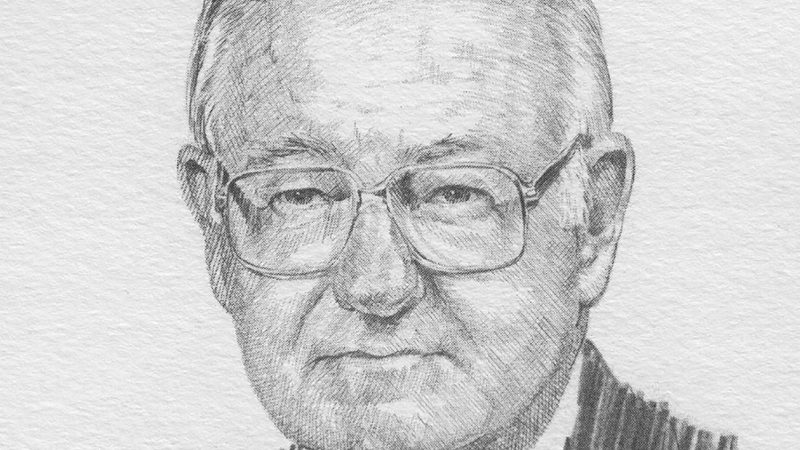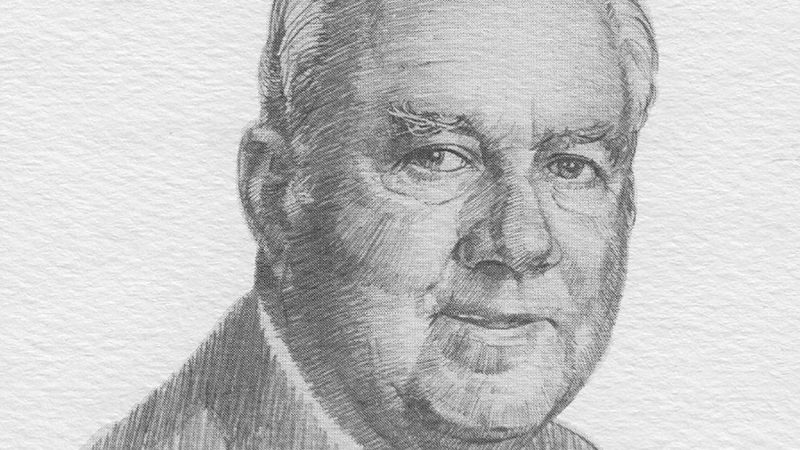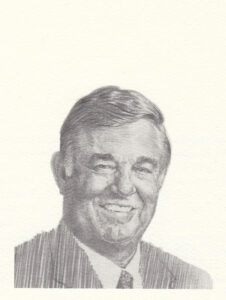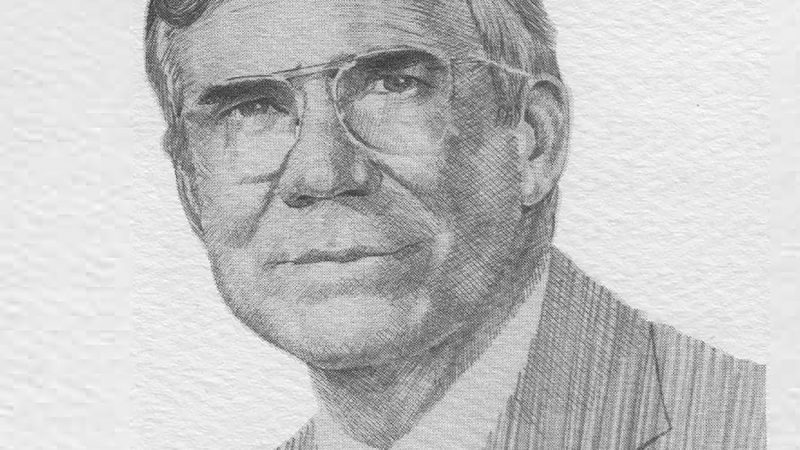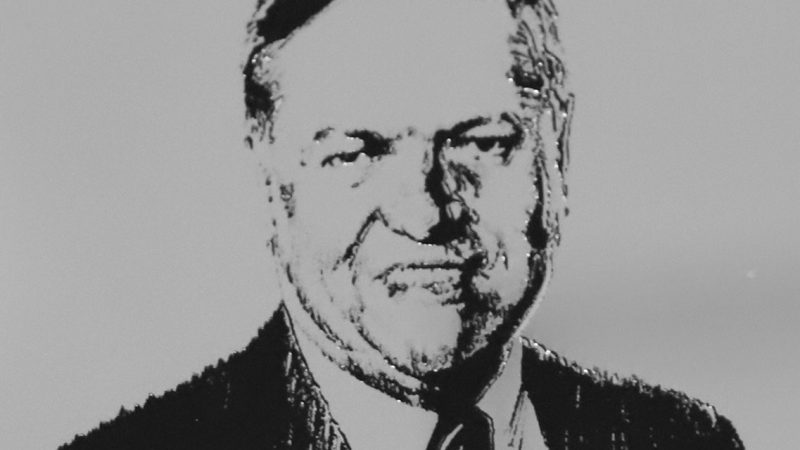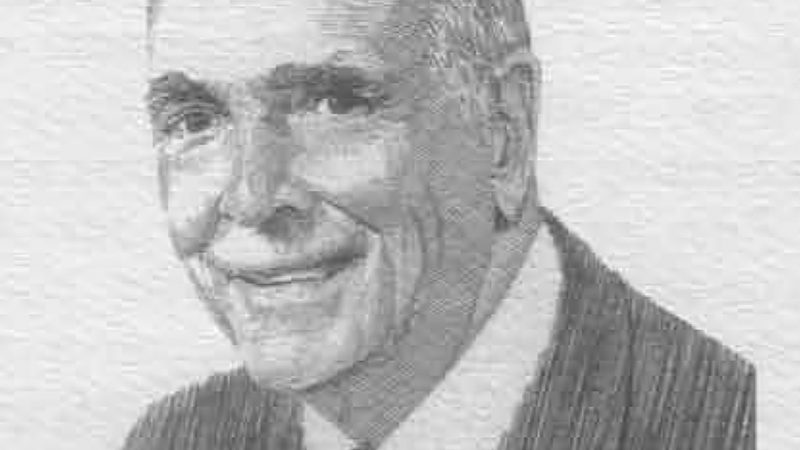Hugh Franklin Culverhouse, Sr.
- October 26th, 2021
Hugh Franklin Culverhouse, Sr. could serve as a role model for future businessmen and women. The record of his accomplishments reveals that he is a person who does his best in whatever job he undertakes. He has been dedicated to excellence and has worked diligently to achieve it. At the same time, he has relished the joy of working with and helping others.
Hugh F. Culverhouse, Sr. grew up in Birmingham, Alabama, where he was born on February 20, 1919. After graduating from high school, he enrolled at The University of Alabama and was awarded a B.S. degree in 1941-that memorable year when the United States entered World War II.
From 1941 to 1946, the young graduate served in the United States Army Air Force. After discharge, he returned to the University where he completed his law degree in 1947.
While in law school, Hugh Culverhouse taught accounting classes in the College of Commerce and Business Administration. He continued to teach accounting while he served as Assistant Attorney General for the State of Alabama from 1947 to 1949. Hugh Culverhouse evidently enjoyed teaching, for he has since said that he would like to teach again someday because teaching is something special – that is, one cannot measure success in teaching with dollars and cents.
From October 1949 to May 1956 (except for the two years he was recalled to active duty during the Korean War) Hugh Culverhouse served as Special Attorney and Assistant Regional Counsel of the Internal Revenue Service.
In May 1956, “Colonel” Culverhouse (the rank he held at the time of release from active duty) established a private law practice in Jacksonville, Florida. His firm became known for its expertise in the field of taxation, perhaps because (as Hugh Culverhouse has said) he enjoys planning for taxes and economic growth. But, perhaps most significantly, he enjoys working with people and helping them solve their problems.
Hugh Culverhouse is today the senior member of the law firm of Culverhouse & Botts in Tampa, Florida. He holds membership in the Jacksonville, Hillsborough County, and American Bar Association, as well as the Florida Bar and the Alabama State Bar.
As Hugh Culverhouse acquired status in the legal profession, he also began to acquire status as a real estate developer. For example, one of his projects was the successful development of the Palmer Ranch in Sarasota, which included building the golf course for the Chrysler Cup, a stop on the seniors’ golf tour. His holdings also include citrus groves in Okeechobee and Arcadia, Florida, and Ivanhoe Land Development of Miami.
In December 1974, Hugh Culverhouse was awarded the franchise for the National Football League expansion team in Tampa which began play in the fall of 1976 as the Tampa Bay Buccaneers. Very active in league affairs, as well as in the management of his team, he is the past chairman of both the Executive Committee of the NFL Management Council and the NFL Finance Committee. He is considered one of the most influential owners in the NFL.
Hugh Culverhouse serves on numerous corporate boards of directors including Time Warner, Inc., New York City; the Penn Central Corporation, Cincinnati, Ohio; the Chiquita Brands International, Cincinnati, Ohio. His service also includes membership on the PGA Policy Board and the National Legal Center for Public Interest.
This busy tax lawyer, real estate developer, and professional football team owner has still found time through the years to be a part of civic, educational, and cultural projects in the Southeast and elsewhere.
For example, he was one of the original organizers and first president of the Family Consultation Service in Jacksonville, Florida. He extended his involvement and contributions to family and children’s welfare by supporting, among others, the Center for Swallowing Disorders and the Eye Institute at the University of South Florida; the Child Abuse Council; the Children’s Home; the Hospital for Special Surgery in New York; and the Foundation for Children with Learning Disorders.
In addition to his concerns for health care, he has endeavored to enrich the lives of individuals through the support of the Sarasota Opera and the Tampa Bay Performing Arts Center.
He has also dedicated his time to economic progress in his adopted state by serving as a member of a variety of state and local organizations-from a member of the Florida Council of 100 and its chairman of the Committee on Sports and Tourism; to the Governor’s Council on Physical Fitness & Sports and the Sunshine Games Foundation; to the Florida Council on Economic Education; to the Greater Tampa Area Chamber of Commerce.
His support of excellence in higher education in both Florida and his native state of Alabama is legendary.
He is a member of the Board of Trustees of Jacksonville University in Jacksonville, Florida, and of the Board of Overseers of Stetson University’s College of Law. He has endowed chairs at Stetson University College of Law, Jacksonville University, the University of Florida College of Law, the University of South Florida in Tampa.
At his alma mater, The University of Alabama, Hugh Culverhouse has been a long-time member of the University’s National Alumni Association. For many years, he has been a member of both the Commerce Executives Society and the College of Commerce and Business Administration’s Board of Visitors-those groups dedicated to providing necessary guidance and financial support in addition to state support to ensure that the university can provide quality programs and service. In March 1984, Hugh Culverhouse’s gift to the University’s Capital Campaign enabled the creation of an endowed chair-the Hugh F. Culverhouse Chair of Accountancy. Then, in April 1988, he made a $2 million contribution to C&BA’s School of Accountancy. This largest individual financial contribution in the history of the University, at that time, was perhaps Hugh Culverhouse’s way of showing appreciation for the education he received at the University. He once said that the education he received at The University of Alabama was his platform to life and it has immeasurably contributed to his happiness.
In appreciation of Hugh Culverhouse’s generosity in providing needed funds to ensure continuing excellence in the accounting program, the University’s School of Accountancy was named the Culverhouse School of Accountancy. For his many-faceted contributions to society,
Hugh Culverhouse has received well-deserved recognition.
In 1976, he was President Gerald Ford’s representative, with the title of U. S. Ambassador, at the Winter Olympics in Innsbruck, Austria.
In 1979, he was the recipient of The Champions of Higher Education in Florida (CHIEF) Award. In 1984, he was the first to receive the Florida Enterprise Medal sponsored by the Merchants Association of Greater Tampa. He has received honorary doctorates from Jacksonville University and Stetson University College of Law. In 1990, he received the Outstanding Business Leader Award from the Northwood Institute of West Palm Beach, Florida, and was inducted into the Jacksonville, Florida, Sports Hall of Fame, and the Alabama Sports Hall of Fame.
At his alma mater, he has been named as Honorary Professor of Accountancy and an Honorary Member of the University Law School’s Order of the Coif. He has been awarded a Doctor of Humane Letters degree by The University of Alabama and a C&BA Distinguished Alumni Award.
Through the years, this versatile, energetic man has had the support of his wife (the former Joy McCann of Montgomery, Alabama, whom he met as a student at the University, and whom he married in 1942) and their two children (Dr. Gay Culverhouse and Attorney Hugh F. Culverhouse, Jr. of Miami, Florida).


